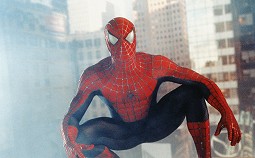![[Deep Focus]](../../flicker/longo.gif)

Spider-Man saves us from lousy studio tentpoles.
![[Deep Focus]](../../flicker/longo.gif)
|
|
| Spider-Man
|
|

|
A- |
Spider-Man saves us from lousy studio tentpoles. |
|
|
Movie Credits: Directed by Sam Raimi Written by David Koepp Based on the comic book by Stan Lee and Steve Ditko Cinematography by Don Burgess Edited by Arthur Coburn and Bob Murawski Production design by Neil Spisak Starring Tobey Maguire, Kirsten Dunst and Willem Dafoe USA, 2002 Aspect ratio: 1.85:1 Screened at Loews Astor Plaza, New York, NY Comic Book Movies @Deep Focus: Dellamorte Dellamore (Cemetery Man) Off-site Links: Spider-Man Crawl Space has a few pages of weird Marvel collectibles. |
Handing Sam Raimi $130 million and the lucrative Spider-Man franchise was anything but a sure bet. Yes, it was a smart move given Raimi's undeniable talent and inherent affection for the material, but the guy hasn't exactly been a box-office dynamo. Moreover, I haven't had much use for anything he's directed since his early masterpiece The Evil Dead, save for his tense A Simple Plan. There are fans who argue that Darkman is a terrific comic-book movie, but I'm not among them, and he was unable to draw any flavor out of genre gimmes like The Quick and the Dead and The Gift. What a relief, though, that he stood at the helm of this film, investing it with the proper degree of respect for Spider-Man's origin story, a great contemporary mythology. In order to sell this stuff, you have to play it incredibly straight. The result is a wonderful blast of nostalgia; the fancy digital effects that allow Raimi to fashion the kind of web-slinging sequences that seemed impossible to put on film just a decade ago turn out to be essential to setting the film's giddy mood, but simultaneously trivial. In comparison to the disarmingly retro characters, the life lessons delivered with a conviction that's gone missing from the movies, and the breathlessly melodramatic romance at the story's core, they're window dressing and filler. In case you're completely unfamiliar with this stuff: Spider-Man is Peter Parker, a geeky honor-student-with-few-friends type who's bitten by an unusual spider and subsequently develops superhuman strength, the ability to climb walls, and a cool "spider sense" that warns him of impending danger. The Marvel Comics version was always sort of a Superman knock-off-Parker even works as a newspaper photographer, echoing Clark Kent's career as a reporter-with the key difference that Parker wasn't just mild-mannered, like Kent, but was actually an ordinary schlep. And, boy, did creator Stan Lee beat him up. Being a Marvel superhero was never a piece of cake, and the early issues of The Amazing Spider-Man were full of loss and mourning. Tobey Maguire, with a poker face punctuated by sad yet dreamy eyes, plays the character to near-perfection just by showing up. Kirsten Dunst plays Mary Jane, for whom Peter carries a torch, with a dash of pathos adding a smidge of depth to her reliable girlishness. And the equally dependable Willem Dafoe plays Norman Osborne with the supernatural aplomb that he brought to such characters as Max Schreck and Jesus. It's in the scenes where Dafoe has manic, staring-into-the-mirror conversations with his villainous persona, the Green Goblin, that Raimi takes his Spider-Man closest to the edge-and gets a massive payoff for taking the risk. Screenwriter David Koepp has made some changes to the comic-book continuity in a bid to streamline affairs-notably combining two female characters into one and giving Spider-Man organic web shooters instead of the science-project contraptions Peter assembled in the comics-but has wisely maintained the cornpone stylings of the original, including the gentle presence of the elderly Aunt May and Uncle Ben as Spider-Man's foster parents and the "With great power comes great responsibility" tagline that defined Stan Lee's ambitions for the character. Indeed, the film carries that lesson to unexpectedly heartbreaking lengths. Like The Lord of the Rings, Spider-Man is grandly, emotionally affecting in a way that it had started to seem that Hollywood blockbusters never would be again. So why isn't this, like, A-plus material? For one thing, while the action scenes are admittedly virtuousic-especially for comic-book fans who have long imagined how this sort of material might be translated intact to film-they're also utterly phony. That Spider-Man gets so much mileage out of its human characters makes it that much more jarring when Tobey Maguire turns abruptly into a cartoon. More significantly, for all its virtues, Spider-Man as a film is missing a strong personality of its own. Raimi seems to have directed mainly by getting the hell out of the way. Sure, some of the touches-like the shots of Peter teaching bully Flash Thompson a well-deserved lesson by kicking, repeatedly, directly into the camera lens-have the startling energy of vintage Raimi, but his generally vivid, in your-face style seems finally to have been mostly subsumed by the rigors of studio filmmaking. When the resulting film is this good, I can't complain too much-it just feels as though it's been wiped clean of directorial fingerprints on the way into the camera (and the digital-effects workstations), and I prefer movies that feel a little more handcrafted. Those cavils aside, Spider-Man is almost as exciting a kick-off for a summer movie season as we could hope for. (And George Lucas will have a lot to live up to when Attack of the Clones opens on May 16.) |
 http://www.deep-focus.com/dfweblog/
bryant@deep-focus.com
http://www.deep-focus.com/dfweblog/
bryant@deep-focus.com